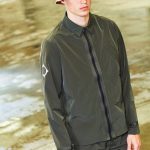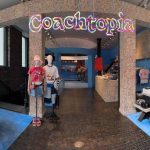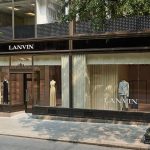Those who entered SugarCity in Halfweg on Wednesday and Thursday found themselves in a denim paradise. It was the return of denim trade fair Kingpins, and as usual, all visitors understood the unofficial dress code perfectly. Visitors with denim hats, skirts with denim fringes, and even a dog with a denim jacket strutted from the cloakroom toward the fairground, sharing compliments about each other’s outfits.
In one hall, groups of people gathered at the bar, deep in conversation with a cup of coffee in hand. It was evident that visitors had been looking forward to the return of the denim fair.
Although the setup of Kingpins seemed unchanged (blue Kingpins flags at the entrance and booths, and the same layout in the halls), a significant change had occurred behind the curtains. Leading German trade fair organizer Messe Frankfurt became a shareholder of Kingpins back in July, with the two parties stating at the time the strategic collaboration would “strengthen the future of the denim industry”.
Vivian Wang, managing director of Kingpins, mentioned in an earlier interview with FashionUnited that the collaboration with Messe Frankfurt demonstrates how crucial the denim industry is. For instance, Kingpins has a variety of sustainability initiatives and educational programs that, according to her, could attract a new audience in other sectors. In other words, they are leveraging each other’s networks and expertise.
Vivian Wang: ‘Kingpins must retain the same feel’
On the fairground, the collaboration between Kingpins and Messe Frankfurt remained invisible. Kingpins continues to operate independently, maintaining the same blueprint and the same atmosphere, Wang emphasized. “We remain a platform for the industry to meet, network, and share information and insights.”
Indeed, Kingpins appeared unchanged. About a hundred exhibitors, spread across three halls and one floor, were ready for two days of meeting industry figures and writing orders. The vintage showroom was present in this edition, and various talks were once again held in the seminar room.
New this edition was a presentation of The Most Sustainable Product (MSP) initiative. Through digital screens, visitors could slide through a library of fabrics and finishes used in the MSP collection. Visitors seemed to appreciate the addition to the show. So much so, that just after noon there is even a small line forming at the touchscreens to learn more about the products. Also new is the One Denim initiative, designed to reduce waste in the sector by showing that a variety of looks can be created with just one fabric.
Sustainability is the talk of the day
The increasing presence of sustainability as a theme at Kingpins was already evident at previous editions. This time round, sustainability really seemed to be the talk of the day, noted Gabriel T Magopat, sales manager Europe at Cone Denim. “We didn’t bring our vice president of sustainability for nothing,” Magopat said. The sales manager shows off a special collection of denim items made from 100 percent recycled cotton. They feel soft but sturdy. “Visitors show particular interest in these, and our vintage-look-alike collection is also very popular,” she added.
Magopat acknowledges that sustainability has become an increasingly important topic in recent years. “You have to respond to that, and I think the denim industry has understood that message,” she said. “If I look around, I see something related to sustainability at every booth. It has to be that way because the first question people ask is: Is it sustainable?”
For newcomer Spinnova – a Finnish fiber producer – the demand for sustainability is a blessing. “We have launched a denim product, and Kingpins is the place to be,” said brand director Diana Balanescu. “We have already collaborated extensively with other facets of the fashion industry; our denim product is the new addition. We notice a lot of interest in it.”
Furthermore, Balanescu stated that Kingpins feels like a fair where exhibitors collaborate with each other and learn from one another. “The denim industry is one of the most authentic industries that exists. Our time here (at Kingpins) feels like a school rather than hard-selling. We are here to grow with the community, not necessarily just to sell our product.”
Collaboration with Messe Frankfurt not noticeable on the fairground
Cone Denim is a true Kingpins veteran, having been present at the fair since its inception. Does Magopat notice any difference now that Messe Frankfurt has acquired shares in Kingpins? The short answer: No. “It might be too early to notice changes,” he said. “Messe Frankfurt is an old hand in the business. Kingpins stands on its own, and I am actually glad that no major changes have taken place. There is plenty of space here, it is easily accessible, and we can network,” he said as he carefully examined the hall once again.
Additionally, Cone Denim has already built a loyal customer base they can rely on. “It’s good for us to be here, to make our presence known,” Magopat said. “Completely overhauling the fair might not have worked in our favor. We have spoken to a few new brands here and there, but whether that’s because Kingpins can leverage the Messe Frankfurt network is hard to say.” The sales manager does notice relatively few German visitors. “We have mainly assisted Dutch and American brands in this edition.”
At the stand of Austrian fiber producer Lenzing, no difference is noticed on the fairground either. “Of course, we are aware of the collaboration,” said Hayato Nishi, business development manager, North America. “I expected the formality of Messe Frankfurt to be more noticeable on the fairground, but it isn’t. That’s not a problem because the denim industry is ultimately very creative, and perhaps a ‘very formal’ approach doesn’t fit in.”
The fact that the collaboration with Messe Frankfurt does not bring significant changes is also confirmed at the stands of Lycra and Jeanologia. “This is Kingpins as we know it, and we are satisfied with that,” concluded Carmen Silla, global brand and marketing director of Jeanologia.
This article was created in collaboration with editor Marthe Stroom. It was first published on FashionUnited.NL before being translated and edited.



